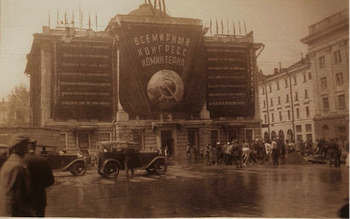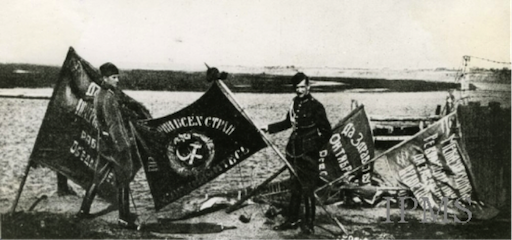

|
The Comintern  'Workers of the World Unite The Bolsheviks were keen to coordinate the activities of the new Communist parties and to keep them well apart from the Social Democrats of the Second Socialist International (1889-1916) by organizing them through the Comintern - the Communist or Third International. They were scornful of the European socialists who had backed their national governments in the First World War. It was to set themselves apart from them that the Bolsheviks had in 1918 decided to describe themselves as Communists rather than as Social Democrats. Moscow's control of the Comintern was set firmly from the start. At its founding congress in the Kremlin, in March 1919, Lenin insisted on structuring the Comintern as a centralized bureaucracy in the Bolshevik image. The '21 Conditions' passed at the Second Comintern Congress in July-August 1920 forced all parties applying for admission to the Comintern to break relations with the Socialists in their countries and accept as binding the decisions of the Russian-dominated Executive Committee. While the Second Congress was in session the Red Army advanced on Warsaw. It was the climax of the Soviet-Polish war which had begun with the Polish invasion of Galicia and Ukraine in 1919. Following the Red Army was a Provisional Polish Revolutionary Committee led by Dzerzhinsky, the Cheka boss, with instructions to hand over power to the Communists once it arrived in the Polish capital. The Bolsheviks believed the Sovietization of Poland would spark revolutions in Europe. The Red Army was pushed back from Warsaw by Polish soldiers and workers, whose patriotism and hatred of the Russians proved more powerful than the class divisions on which a Soviet revolution would depend. Forced to recognize defeat, the Soviets negotiated the contested borders with the Poles and, in March 1921, anxious to secure a peace at a time of unrest at home, signed the Treaty of Riga. It was the start of a new era of peaceful co-existence between Russia and the West.  Polish soldiers with captured Soviet flags after the Battle of Warsaw Defeat in Poland was the first of several setbacks that made Lenin think again about exporting revolution to Europe. During March a large strike action planned by the German Communists in the Halle and Mansfeld industrial regions of Saxony failed to develop into a revolt. After this defeat, the Third Congress of the Comintern steered a course away from revolutionary adventurism towards more patient propaganda and trade-union work. 'Only now do we see and feel that we are not immediately close to our final aim, the conquest of world power,' Trotsky told the delegates. 'We told ourselves back in 1919 that it was a question of months, but now we say that it is perhaps a question of several years'. |
© 2014 Orlando Figes | All Rights Reserved